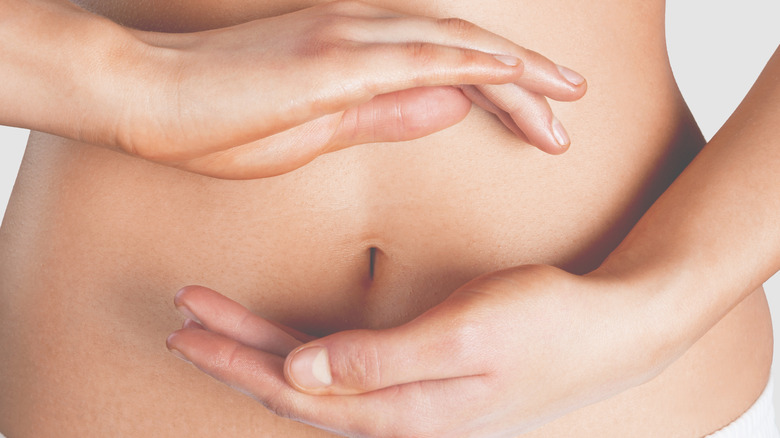Do Colonics Unbalance Your Gut Health?
Here in America, we love a good old-fashioned health fad. If someone on the internet said it can improve our health, we're on it faster than you can say, "Are you sure that's a good idea?" Oftentimes, these fads are not really good ideas. But as the obsession with using Ozempic for weight loss has finally started to lose its luster, colonics are — at last — ready for their time in the sun.
Colon cleansing — also referred to as a colonic — is the not-so-new health trend currently sweeping the nation. Employing the use of hydrotherapy, colonics involve the ushering of up to 16 gallons of warm water into the colon by way of a tube inserted into the rectum (per Mayo Clinic). During the procedure, the water is continuously pushed out through the rectum, taking with it the contents of your colon. The idea, of course, is that it rids the colon of waste (per Digestive Health Centre). However, in recent years, some alternative medical practitioners have been touting the procedure as a great way to detoxify the body and treat digestive issues like bloating, colitis and constipation (per Cleveland Clinic). Now, colonics are available at wellness centers and spas, administered by non-medical professionals.
So, the question is: Is this a health fad bandwagon you should jump on? Unfortunately, there's a chance that getting a colonic could cause more harm than good, as the procedure carries the risk of several negative side effects, and it can mess with your gut microbiome as well. Let's learn more.
Side effects of colonics
While proponents of colonics boast that they are a great way to detoxify the body and maintain colon health, the Cleveland Clinic explains that this theory stems from the ancient idea that when the body doesn't rid itself of waste products in a timely fashion, the result is a slow poisoning of the body which causes a slew of health conditions, like elevated blood pressure and arthritis. However, there is no evidence to suggest that this is true, and healthcare professionals are quick to point out that our body has its own system for the disposal of waste. In fact, for some people, opting to have a colonic can even be detrimental to their health.
The Mayo Clinic reveals that colonics can come with some rather unsavory side effects. While less harmful side effects can include cramping, diarrhea, nausea, and vomiting, more serious complications like dehydration, a perforation (or tear) in the rectum, and infection are also possible. Colonics can also cause an upset in the body's electrolyte balance — a side effect that is particularly dangerous for people with kidney or heart conditions.
Colonics and gut health
Aside from the potential dangers, another reason you may want to steer clear of colonics is that it can quite literally do the opposite of what you want it to do. While most people who seek out colonics are hoping to address digestive issues — or at the very least, achieve a healthier gastrointestinal tract — colon cleaning can actually harm the gut microbiome.
Each of our guts is home to over 100 trillion microbial cells (per Cleveland Clinic). These cells have spent the last six million years evolving with the human body, figuring out how to cultivate a symbiotic relationship that does as much good for us as it does for them. In exchange for a good home and an endless buffet, the microbes promise to help us in the areas of digestion, metabolism, inflammation, and immune response. However, when the colon is flooded with gallons of water, many of these microbes — the good bacteria — are washed away along with the waste (per National Women's Health Network).
While Mount Sinai Sinai suggests that the imbalance caused by a colonic should be naturally restored within 2-4 weeks, the Cleveland Clinic is quick to point out that there is no evidence that the average human body needs help in the colon-cleansing department. If you're experiencing digestive issues that you think could be helped by a colonic, it's best to speak with your doctor first, as they may have a more effective treatment plan that can leave your gut microbiome intact.



